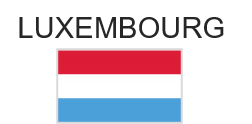The table below aims at gathering the administrative and governmental bodies of Luxembourg, which are responsible for digital public administration policies and interoperability policies.

National
Following the general elections on 14 October 2018, Luxembourg’s new government created a Ministry for Digitalisation in charge of all the topics linked to digitalisation and responsible for guaranteeing even higher speed and quality. The Ministry for Digitalisation is a facilitator and coordinator for other ministries and other partners wishing to develop their activities in the field of digitalisation and eGovernment. Offering more eGovernment services in collaboration with the CTIE is one of the top priorities of the newly created ministry, in order to foster the modernisation of public administrations and improve the daily life and administrative processes of citizens and businesses.
The competences of the new Ministry for Digitalisation were defined by the Grand Ducal Decree on the Establishment of Ministries on 5 December 2018 and can be summarised as follows:
- Implementation of the Digital Luxembourg Action Plan and monitoring of the ICT sector (shared competence with the Minister for Economy and the Minister for Communications and Media);
- Promotion of the ICT sector (shared competence with the Minister for the Economy);
- Digitalisation of administrative procedures and digital transformation of the public administration;
- Follow-up on the work of the newly created High Digital Transformation Committee;
- Development and implementation of a plan on the Internet of Things.
- Development of the digital infrastructure (in consultation with the Minister for Communications and Media);
- Development of a national strategy in the field of AI (in consultation with the Minister for Communications and Media and the Minister for the Economy);
- Implementation of the 5G national strategy and development of pilot projects (in consultation with the Minister for Communications and Media);
- Assuring a policy of digital inclusion;
- Promotion and organisation of State administrations’ automation, in particular as regards the collection, transmission and processing of data;
- Seeking synergies between the different ministries and optimising their exchange of information;
- Assisting the various administrations of the State in the execution of the routine IT work and the management of fixed and mobile communication systems; and
- State electronic filing.
In February 2020, the Ministry for Digitalisation set up an Inter-ministerial Committee for Digitalisation in Public Administration. The committee is chaired by the Ministry for Digitalisation and the CTIE, and includes members responsible for the digital transformation in other Ministries. It meets on a regular basis to take stock of Luxembourg’s digital projects and to set a coordinated agenda of initiatives aiming to reinforce eGovernment in Luxembourg.
Due to the restrictions linked to the Covid pandemic, the second central component of the digital governance structure, the High Committee for Digital transformation, was only established in September 2022. It brings together the various Ministries, representatives of civil society and experts from several backgrounds. By its composition, the High Committee is dedicated to considering the challenges of digitalisation from various perspectives affecting the economy, work, education, health, continuing education or digital public services. Its members meet twice a year to propose, analyse and discuss potential initiatives and projects to advance digital government, while considering the digital inclusion of all citizens.
|
Xavier Bettel Prime Minister / Minister for Communications and Media/ Minister for Digitalisation
Source: http://www.digitalisation.lu |
|
Marc Hansen Minister Delegate for Digitalisation
Source: http://www.digitalisation.lu |
The Government IT Centre (Centre des technologies de l'information de l'État, CTIE) was established in 2009. The Centre constitutes an active part of the Ministry for Digitalisation and is the main administration of the government in the fields of eGovernment, IT and modernisation of the State through ICT.
The CTIE provides service coordination and planning to government bodies and assists those bodies in the reorganisation and optimisation of their tasks. To this end, the centre coordinates the following activities:
- Organisation of the automation of government departments regarding the collection, transmission and processing of data;
- Development and maintenance of administrative processes' mapping and their interoperability status;
- Provision of organisational support to State administrations and assistance in their reorganisation efforts; and
- Identification of synergies between the various State administrations and optimisation of the information exchange among them.
The CTIE is also responsible for implementing the provisions that originate directly from the government programme and the eGovernment Strategy. In addition, it is the administrative body responsible for IT services for Luxembourg’s government, Ministries and public administrations. It offers a wide range of services to its clients, namely more than 14 000 end users in the public administration. These services cover all areas of IT, including network and communication infrastructure, hosting, private cloud (Infrastructure as a Service or IaaS), platforms (Platform as a Service or PaaS), generic and customised software solutions (Software as a Service or SaaS), as well as related services such as secure document generation, individualised mass printing, etc. The CTIE also manages office automation and telephony for Ministries and administrations, and is responsible for implementing and enforcing the State’s IT infrastructure security policies.
Furthermore, the CTIE is responsible for specific tasks, such as the management of the Guichet.lu Portal, the SPOC for citizens and businesses for carrying out public procedures. The portal’s interactive MyGuichet.lu platform offers modern and easy-to-use digital services and is a key element of Luxembourg’s digital strategy. In addition to a support centre (helpdesk) for the internal and external users of the systems operated by the CTIE, the CTIE also runs the Guichet.lu Helpdesk, whose primary goal is to help citizens and enterprises carry out their administrative procedures.
The responsibilities for different aspects (legal, operational, semantic or technical) of the main base registries in Luxembourg are partially decentralised to the registry itself and partially centralised to a central organisation. Most of the responsibilities are managed in a decentralised way by each authority in charge of the corresponding registry, and include the operational and legal ownership of the registry, the operational aspects, such as service levels and access formalities, and the decision on semantic levels. Such authorities are, for example, the National Society for Technical Control (SNCT), the Ministry of Justice, the Ministry of Finance, and the Cadastre and Topography Administration of the State of Luxembourg. In this field, the CTIE enables the digital exchange of information across the public sector. Its responsibilities are, aside from maintaining one specific registry (the RNPP), to provide general support for interoperability between administrations and to devise a broader strategy that drives the evolution of base registries.
The Department of Media, Connectivity and Digital Policy (SMC) of the Ministry of State is responsible for the coordination and development of the national communications infrastructure (national and international connectivity, wired and wireless networks, data centres) and digital policy. The Department is also responsible for:
- The governance and implementation of the national 5G strategy;
- The governance and implementation of the strategic vision on Artificial Intelligence;
- The governance and implementation of the ultra-high-speed broadband strategy;
- The governance and modernisation of the national communication infrastructure for public safety agencies.
The Ministry of Economy is responsible for creating a business environment that fosters innovation in the IT sector by granting public aid to start-ups, implementing a seed funding and venture capital framework, and simplifying and improving the relationship between IT innovators and the public sector.
Via Luxinnovation, the national innovation agency under the supervision of the Ministry of Economy, Luxembourg is supporting digital transformation projects, especially those following the Data-Driven Strategy of Luxembourg, which focuses on the use of new IT technologies and collaborative creation of added value. This includes cloud, big data, HPC and AI.
The agency has updated its strategy to focus its efforts on two major axes: digital and sustainable development. Regarding the digital axis, the agency has set up a new Digital Transformation Department responsible for all digital transformation matters and encompassing the Digital Innovation Hub (DIH), the HPC Competence Centre (HPCCC) and the Gaia-X national hub. This department supports companies in their digital transformation according to their own degree of maturity and their own vision. From conceptual approach to project execution, the Digital Transformation Department supports companies in giving life to their project and work closely with the Research, Development and Innovation (R&D&I) Support Department, where experts translate these ideas and needs into R&D&I projects eligible for the various national and European aid programmes. In 2021, the DIH, focusing on the industry, interacted with over 100 companies with regard to their digital transformation.
Luxembourg also has a State aid scheme based on the General Block Exemption Regulation (GBER) which aims to incentivise companies to undertake innovation and research projects. These go from a simple digitalisation of internal processes, in particular for SMEs, to research projects aimed at developing new processes or products based on business and artificial intelligence. In addition, strategic public-private partnerships (PPPs) are organised to foster cooperation between national research organisations and companies (e.g. PPP Health Tech).
The Ministry of Finance is responsible for supporting the development of innovative IT tools for the financial sector, such as electronic and/or mobile payment solutions, virtual currencies, and financial data analytics tools and services.
The Ministry of Higher Education and Research is in charge of promoting eSkills, IT training, and research and development (R&D) programmes in IT.
The Ministry of the Civil Service is responsible for promoting and assuring:
-
An attractive and exemplary public service enabled by performance-oriented, dynamic and highly motivated public officials; and
-
A quality public service based on a simple, innovative and effective regulatory framework, which favours social cohesion and the economic prosperity of Luxembourg.
The National Commission for Data Protection (CNPD), created in December 2002, is an independent agency whose task is to control the processing of personal data in Luxembourg and to ensure compliance with data protection regulations.
The Association of Luxembourg’s Cities and Municipalities (Syvicol) is the political representative body of Luxembourg’s municipalities. It is the government’s interlocutor for issues of general municipal interest. Syvicol promotes cities’ interests, and advises on legislative and regulatory projects that have an impact at the local level, including matters concerning future eGovernment strategies and laws at a local/municipal level.
The Inter-Communal IT Management Association (Syndicat Intercommunal de Gestion Informatique, SIGI) is a service provider set up by Luxembourg’s municipalities to coordinate the development of common systems, and to promote the exchange and reuse of solutions and good practices. 101 out of the 102 local authorities in Luxembourg are members of the SIGI and benefit from its IT services related to citizenship (population records, births, deaths and marriages, electoral registers, tax cards, etc.), invoicing and administrative accounting.
The SIGI project management office’s role is to take charge of the new demands of different actors and to formalise them in a portfolio of projects before proceeding with their planning and execution. The application of methodological standards, in a structured framework and with experienced staff, guarantees the implementation of quality solutions.
Support is a key element of the service offered by the SIGI, which includes incident management and change management. It is often the first point of contact of municipalities with the SIGI, either to solve a problem or simply to receive advice.
The National Commission for Data Protection (CNPD) is an independent authority established by the Law on the Protection of Persons with Regard to the Processing of Personal Data of 2 August 2002.

